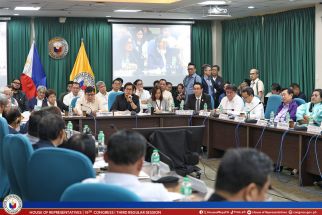DENR to host national biodiversity conference
November 5, 2006 | 12:00am
Some 300 participants from national government agencies, private companies and non-government organizations will converge in Verde Island off the coast of Batangas next week for a National Biodiversity Conference that seeks to map out an action plan to avert a looming biodiversity crisis.
Environment Secretary Angelo Reyes said the conference is in response to President Arroyo’s call to make biodiversity a national concern by integrating different conservation efforts into the development plans of local government units that host biodiversity areas.
"President Arroyo ordered the holding of the conference in response to studies made by scientists, which show that the Philippines may already be in the middle of a ‘biodiversity crisis’," Reyes said in a statement.
He said the conference’s venue — Verde Island — was recently named by a team of international biologists as the "center of marine shore fish biodiversity in the world."
High in the conference’s agenda is making local officials understand the importance of biodiversity, which has a direct link to everyday issues like health and food security and, consequently, to poverty alleviation.
The conference will seek to draw a road map, which will enable provincial and town officials to work together toward the conservation of protected areas within their jurisdictions.
In a report, the Philippine Biodiversity Conservation Priority-setting Program (PBCPP) said the problem of biodiversity loss in the Philippines "can no longer be considered as signs of an impending biodiversity crisis because, apparently, the Philippines is already in the middle of one."
The country, it added, stands to lose its rich biological heritage irreversibly and prove many experts’ prediction of it becoming a global biodiversity area.
According to PBCPP, the Philippines is one of two countries in the world considered as a biodiversity hotspot. The other country is Madagascar.
A biodiversity hotspot is an area that has a high diversity of plants and animals, which are endemic, but face serious pressures or threats of species loss and habitat destruction.
On a per hectare basis, the Philippines is among the top 18 mega diversity countries in terms of biological richness, with its more than 52,177 described species, more than half of which are found nowhere else in the world.
Together, these 18 mega diversity countries contain between 70 and 89 percent of global biodiversity, and thus form an integral part of the global heritage for conserving the diversity of life on earth.
In the 2000 Red List of the International Union for the Conservation of Nature and Natural Resources (IUCN), 418 of the country’s 52,177 species were listed as threatened.
Environment Secretary Angelo Reyes said the conference is in response to President Arroyo’s call to make biodiversity a national concern by integrating different conservation efforts into the development plans of local government units that host biodiversity areas.
"President Arroyo ordered the holding of the conference in response to studies made by scientists, which show that the Philippines may already be in the middle of a ‘biodiversity crisis’," Reyes said in a statement.
He said the conference’s venue — Verde Island — was recently named by a team of international biologists as the "center of marine shore fish biodiversity in the world."
High in the conference’s agenda is making local officials understand the importance of biodiversity, which has a direct link to everyday issues like health and food security and, consequently, to poverty alleviation.
The conference will seek to draw a road map, which will enable provincial and town officials to work together toward the conservation of protected areas within their jurisdictions.
In a report, the Philippine Biodiversity Conservation Priority-setting Program (PBCPP) said the problem of biodiversity loss in the Philippines "can no longer be considered as signs of an impending biodiversity crisis because, apparently, the Philippines is already in the middle of one."
The country, it added, stands to lose its rich biological heritage irreversibly and prove many experts’ prediction of it becoming a global biodiversity area.
According to PBCPP, the Philippines is one of two countries in the world considered as a biodiversity hotspot. The other country is Madagascar.
A biodiversity hotspot is an area that has a high diversity of plants and animals, which are endemic, but face serious pressures or threats of species loss and habitat destruction.
On a per hectare basis, the Philippines is among the top 18 mega diversity countries in terms of biological richness, with its more than 52,177 described species, more than half of which are found nowhere else in the world.
Together, these 18 mega diversity countries contain between 70 and 89 percent of global biodiversity, and thus form an integral part of the global heritage for conserving the diversity of life on earth.
In the 2000 Red List of the International Union for the Conservation of Nature and Natural Resources (IUCN), 418 of the country’s 52,177 species were listed as threatened.
BrandSpace Articles
<
>
- Latest
- Trending
Trending
Latest
Trending
Latest
Recommended

































